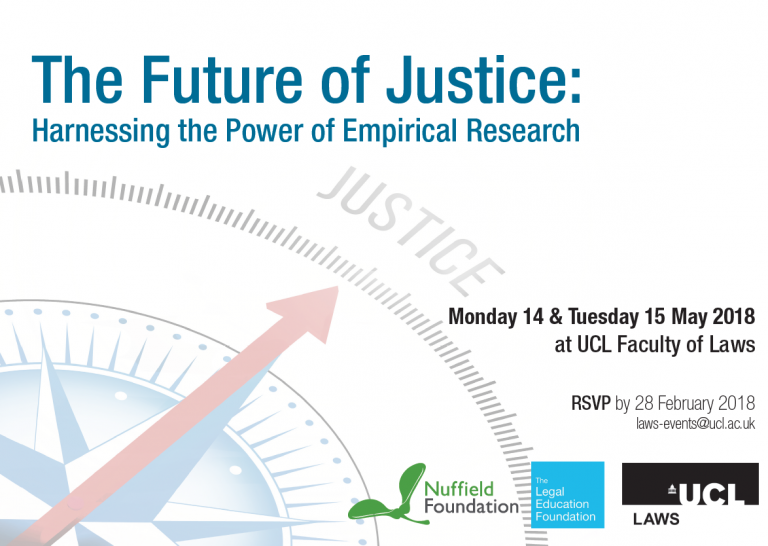International symposium ‘The Future of Justice’ aims to set empirical research agenda
16 May 2018

On 14th and 15th May 2018, leading researchers, judiciary, funders and practitioners came together at UCL Faculty of Laws for an international symposium on 'The Future of Justice: Harnessing the Power of Empirical Research'.
The symposium, held at the newly redeveloped Bentham House, was organised in response to current reforms to the England and Wales justice system, which will affect processes in criminal, civil and family courts, and tribunals, and aimed to develop a sense of the emerging priorities for research and a consensus on the level of commitment needed to build capacity to deliver this research agenda.
Watch video recordings of the panels
Jointly convened by UCL Laws with the Nuffield Foundation and the Legal Education Foundation, the two-day event also had the honour of hosting the inaugural Nuffield Foundation Annual Lecture with the President of the Supreme Court of the United Kingdom, The Right Honourable the Baroness Hale of Richmond speaking on ‘Challenges in the justice system and the contribution of empirical research’.
Other highlights from the symposium included a keynote address by Professor Richard Susskind OBE and a series of panel discussions with international speakers including Shannon Salter, Chair of the British Columbia Civil Resolution Tribunal, and Professor Judith Resnik of Yale Law School, who will receive honours at the UCL Laws graduation ceremony in July.
Professor Dame Hazel Genn, Director of the UCL Centre for Access to Justice said:
‘As jurisdictions around the world respond to technological development and undergo transformative changes in the design and delivery of state justice systems, this symposium has been a timely opportunity to reflect on critical research questions that arise, and to begin shaping an international research agenda.
This conference presents the opportunity for an exciting new justice system research agenda, and it has been a pleasure to have the opportunity to collaborate with the Nuffield Foundation and Legal Education Foundation in creating this international conference on The Future of Justice.'
Tim Gardam, Chief Executive of the Nuffield Foundation, said:
‘As the justice system undergoes fundamental reform in a time of austerity, the “justice research gap” has opened further, and we find ourselves without the necessary empirical research to inform the design and operation of a transformed justice system. This symposium aimed to help close the gap, by articulating priority questions for the justice research agenda, and identifying ways we might build capacity to deliver it.
The symposium will also inform our own funding priorities, and we will continue to work with The Legal Education Foundation and UCL Faculty of Laws to harness the power of empirical research within the justice system.’
Matthew Smerdon, Chief Executive of The Legal Education Foundation, said:
'Supporting the creation of robust evidence is critical to The Legal Education Foundation’s mission. Empirical research is vital: to improve understanding of the ways in which citizens engage with the justice system; to understand the impacts on outcomes of the move from traditional to new court processes; and to understand how to make the most effective use of public resources. This conference brought together a fantastic group of stakeholders who articulated an exciting and challenging agenda for research in the coming years. The conference also underlined the pressing need to work together to develop both a coherent agenda for empirical research and the will and resources to deliver it.'
 Close
Close

